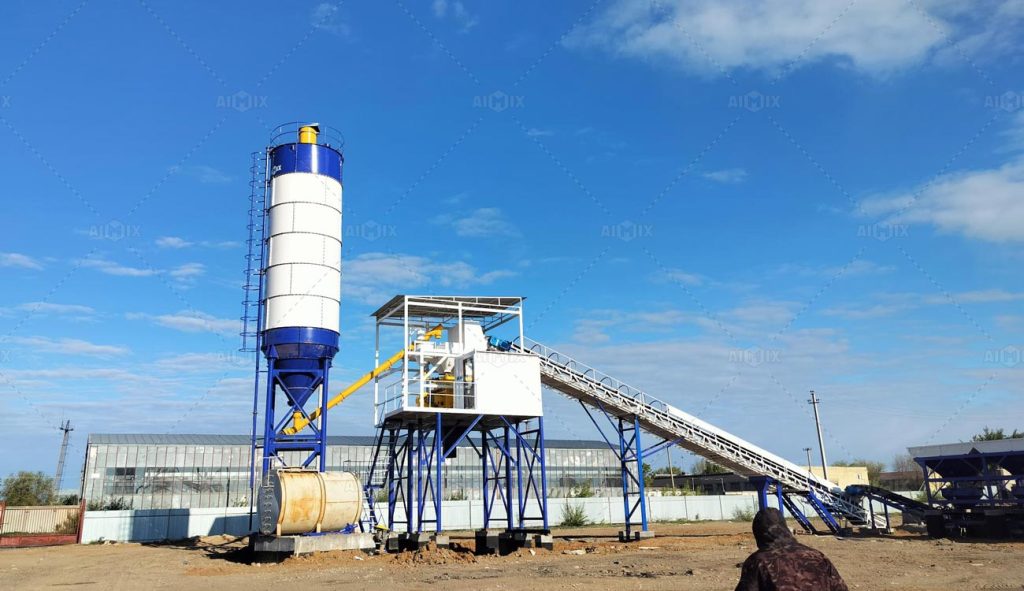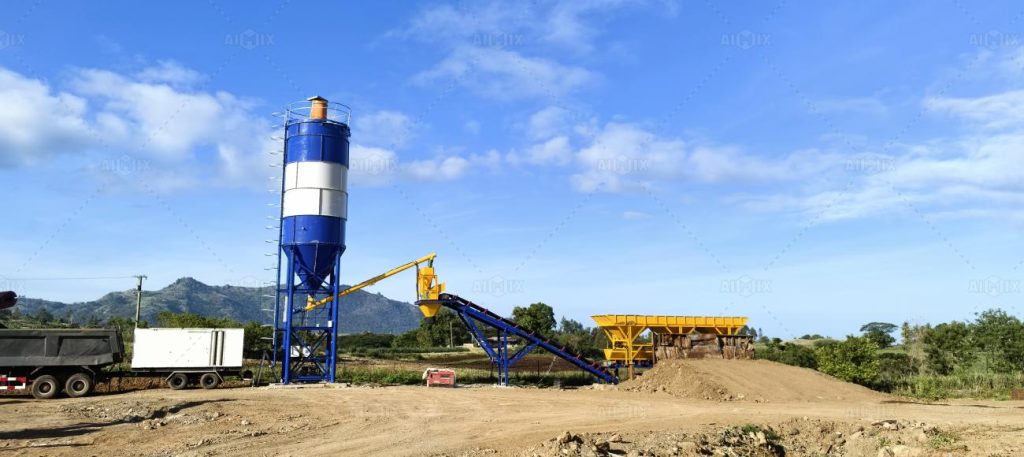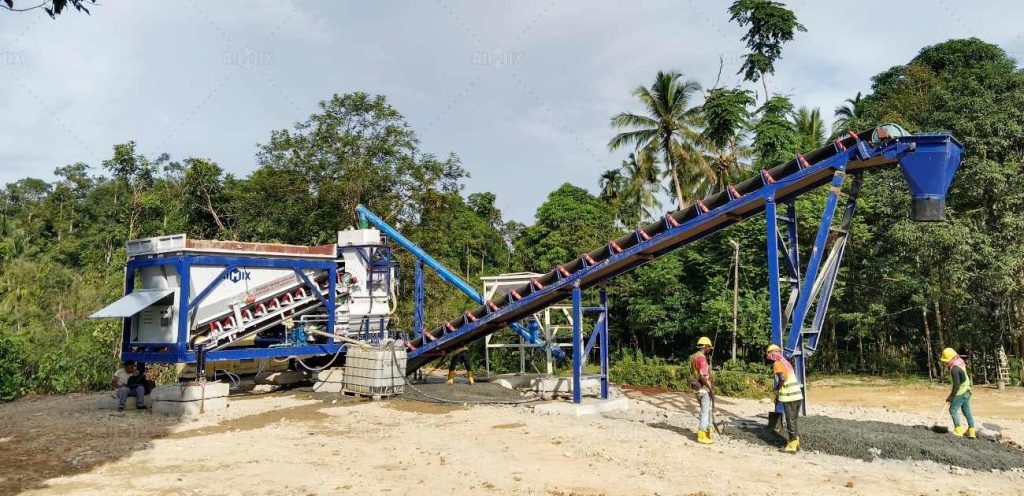In today’s construction industry, sustainability and energy efficiency have become essential considerations for all types of concrete production. Small concrete batching plants, including mini concrete batching plants and small RMC plants, play a pivotal role in providing flexible, cost-effective, and environmentally responsible concrete solutions for urban and regional projects. This article explores the strategies, technologies, and design considerations that enhance energy efficiency and sustainability in small concrete batching plants.

The Importance of Energy Efficiency in Small Concrete Batching Plants
Energy efficiency is critical in reducing operational costs and environmental impact in concrete production. Small concrete batching plants, including mini concrete batching plants and small RMC plants, are typically deployed in urban construction, residential projects, and smaller infrastructure works. Despite their smaller scale, energy efficiency remains a significant factor due to:
-
High frequency of batching operations for multiple construction sites
-
Use of electricity and fuel for mixers, conveyors, and auxiliary systems
-
Environmental regulations requiring lower carbon emissions
Implementing energy-efficient technologies ensures that small plants can deliver high-quality concrete while minimizing electricity and fuel consumption.
Key Design Considerations for Energy Efficiency
Designing an energy-efficient small concrete batching plant requires attention to several components and systems.
a. Efficient Mixers and Motors
-
Twin-shaft mixers or planetary mixers are preferred in mini concrete batching plants for their high efficiency and uniform mixing.
-
Motors with variable frequency drives (VFDs) adjust power according to the load, saving electricity during partial batches.
-
High-efficiency motors reduce heat loss and energy consumption during prolonged operation.
b. Optimized Material Handling
-
Shortened conveyor distances reduce energy requirements for aggregate and cement transport.
-
Proper layout of hoppers, weighing systems, and mixing units minimizes unnecessary movement, improving energy efficiency.
-
Automatic batching systems ensure accurate material dosing, reducing overproduction and energy waste.
c. Insulation and Temperature Management
-
For small RMC plants, maintaining optimal water and material temperature is crucial for consistent concrete quality.
-
Insulated water tanks and heated cement silos prevent energy loss in cold climates, reducing additional heating requirements.

Sustainability Practices in Small Concrete Batching Plants
Sustainability in small concrete batching plants goes beyond energy efficiency. It includes material recycling, waste reduction, and eco-friendly operations.
a. Use of Recycled Aggregates
-
Incorporating crushed concrete or recycled industrial by-products reduces reliance on natural aggregates.
-
Both mini concrete batching plants and small RMC plants can be adapted to handle mixed aggregate sources.
-
This practice reduces landfill waste and lowers the overall carbon footprint of construction projects.
b. Low-Carbon Cement and Supplementary Cementitious Materials (SCMs)
-
Partial replacement of cement with fly ash, slag, or silica fume reduces CO₂ emissions during production.
-
Small concrete batching plants can be equipped with precise dosing systems to handle SCMs effectively.
-
This not only improves sustainability but also enhances certain concrete properties, such as durability and workability.
c. Water Recycling and Management
-
Wash water from mixers and trucks can be collected, filtered, and reused, reducing freshwater consumption.
-
Small RMC plants often incorporate compact water recycling systems, supporting sustainable water management practices.
-
Rainwater harvesting can further supplement concrete plant operations in regions with sufficient rainfall.
Automation and Smart Controls
Automation plays a key role in energy efficiency and sustainability:
-
PLC and touchscreen control systems monitor real-time energy consumption, adjusting motor loads and batching sequences for optimal efficiency.
-
Remote monitoring allows operators to control multiple plants, minimizing unnecessary idling or overproduction.
-
Automated diagnostics detect potential equipment issues early, preventing energy waste caused by malfunctioning machinery.
By integrating smart systems, mini concrete batching plants and small RMC plants achieve higher energy efficiency while ensuring consistent concrete quality.

Modular and Compact Design Advantages
Small concrete batching plants, by their nature, are modular and compact:
-
Reduced footprint minimizes land disturbance, aligning with sustainable urban construction principles.
-
Modular design allows for relocation to different construction sites, reducing transportation energy for concrete delivery.
-
Compact units can be combined with renewable energy solutions, such as solar panels, to power auxiliary systems.
These features make mini concrete batching plants and small RMC plants ideal for environmentally sensitive projects.
Maintenance Strategies for Sustainability
Proper maintenance is essential to maintain energy efficiency and extend equipment lifespan:
-
Regular cleaning of mixers and conveyors reduces friction, lowering energy consumption.
-
Timely replacement of wear parts prevents excessive motor load.
-
Lubrication of moving components ensures smooth operation, reducing power requirements.
Effective maintenance also reduces unplanned downtime, minimizing energy and material waste during operation.
Environmental and Regulatory Compliance
Small concrete batching plants must comply with local and international environmental regulations:
-
Dust collection systems prevent particulate matter from entering the air, protecting worker health and the environment.
-
Noise reduction measures, such as soundproof enclosures for motors and mixers, reduce noise pollution in urban areas.
-
Emission standards for diesel generators or auxiliary equipment are increasingly strict, requiring energy-efficient engines or electric alternatives.
Adhering to these standards ensures sustainable operations and avoids regulatory penalties.
Future Trends
The future of small concrete batching plants focuses on sustainability and digitalization:
-
IoT-enabled energy management allows real-time optimization of energy consumption.
-
Hybrid power systems combining grid electricity with solar or battery storage reduce fossil fuel use.
-
Advanced recycling technologies enable higher incorporation of recycled materials without compromising quality.
-
AI-assisted batching optimization reduces material and energy waste, further enhancing sustainability.
These trends will shape the next generation of mini concrete batching plants and small RMC plants, making them even more energy-efficient and environmentally friendly.
Conclusion
Energy efficiency and sustainability are no longer optional in the construction industry. Small concrete batching plants, including mini concrete batching plants and small RMC plants, are uniquely positioned to deliver high-quality concrete in a cost-effective and environmentally responsible manner.
By integrating energy-efficient mixers, optimized material handling, water recycling, low-carbon materials, and smart automation, these plants reduce operational costs, minimize environmental impact, and comply with modern regulations. Modular and compact designs, combined with effective maintenance strategies, further enhance sustainability while supporting flexible construction operations.
Investing in energy-efficient and sustainable small concrete batching plants ensures long-term economic and environmental benefits, making them a cornerstone of modern, responsible construction practices.